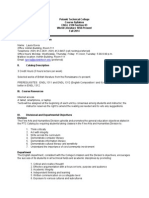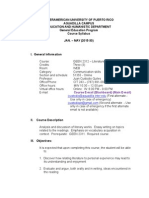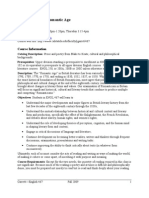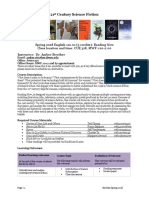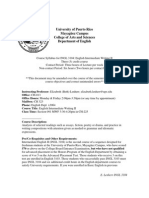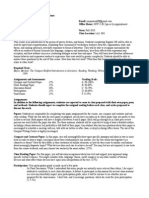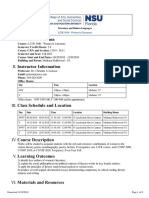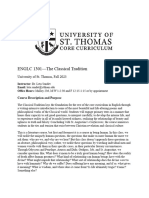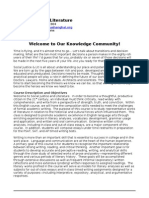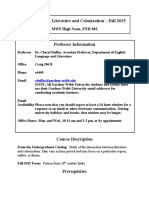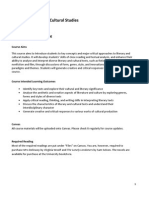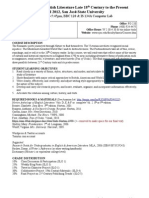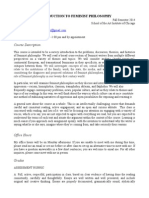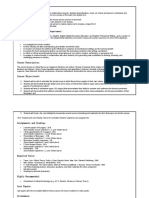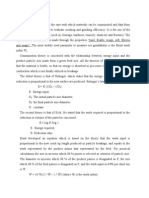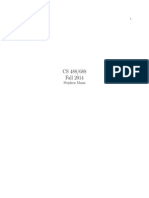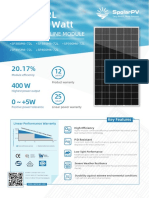ENGL1013 Introduction to 20th-Century Literature
Spring 2025
Contact Information:
Course Instructor: Dr. Nan Zhang
Office: Run Run Shaw Tower, Centennial Campus R744
e-mail: nzhang@hku.hk
Office Hours: Tuesdays, 10:00 a.m. - 11:00 a.m. and by appointment
COURSE DESCRIPTIONS:
This course will explore issues and themes that emerge in 20th century literature and culture and
continue to shape our understanding of contemporary society. We will examine how a variety of
literary and cultural texts depict the challenges of modernity and its impact on society, human relations,
and ways of life. We will pay special attention to how authors have imagined scientific and
technological innovations, represented the consequences of wars, and probed the complexities of cross-
cultural encounters and conflicts.
TEXTS: (*available on the course Moodle)
H. G. Wells, “The New Accelerator” (1901) *
Excerpts from George Bernard Shaw, “The Sanity of Art” (1908) *
Ursula K. Le Guin, “The Ones Who Walk Away from Omelas” (1973)*
H. G. Wells, The War of the Worlds (1898)
Jean Rhys, Voyage in the Dark (1934)
Hualing Nieh, Mulberry and Peach (1981)
ORGANISATON:
There will be three contact hours on Tuesdays (1:30 p.m. – 4:20 p. m.), including a one-hour tutorial.
Tutorial sessions will begin from Tuesday, 18 February. For the tutorial, our class will be divided into
TWO groups, A and B, and please pay attention to announcements on the course Moodle for tutorial
groupings. You cannot switch groups. Please remember which group you are in and attend your
assigned tutorials on time, otherwise you will be marked as absent.
Group A will meet on 18 February, 4 March, 25 March, 8 April, and 22 April
Group B will meet on 25 February, 18 March, 1 April, 15 April, and 29 April
MOODLE:
You can access the course Moodle via HKU Portal. The course Moodle will contain the course
syllabus, links to online texts for each week when applicable, as well as links for the submission of
assignments. I will also make announcements to this class via Moodle and any messages will be sent to
1
�your HKU email address. It is thus imperative that you check your HKU email address at least once a
day. Otherwise, you may miss important class directions and instructions.
ASSESSMENT:
15% class work: attendance, evidence of preparation and intellectual curiosity, participation in
tutorials, which will include speaking up during discussions, brief presentations if appropriate, and
contributing to a positive learning environment
15% quizzes
30% mid-term essay
40% final essay
* Quizzes will comprise multiple-choice and short-answer questions focused on the basic plots of the
texts. These closed-book exercises will be conducted in class.
Dates for quizzes: 25 February, 1 April, 22 April
*Topics for the mid-term essay and final essay will be suggested ahead of time on the course Moodle.
An unexcused late paper will lose one letter grade per day. If you need an extension, please email me in
advance.
Deadlines:
Mid-term Paper (900-1000 words): 5 PM Friday, 21 March
Final Essay (1800-2000 words): 5 PM Friday, 9 May
Class Participation and Attendance
Students are expected to come to class (lectures and tutorials) prepared to participate actively in
discussions and exercises. Please arrive on time and be prepared for each class by completing all the
readings and be ready to share any relevant comments or questions. Students should bring the assigned
texts to class, so that we can analyze and refer to specific passages during class meetings. Students are
expected to attend all class sessions; any unexcused absences will result in an automatic zero for the
attendance portion of their grade. Legitimate excuses for missing a class or a deadline include serious
illness, serious injury, and family tragedy.
Tutorial participation
Tutorials will work best if students contribute to discussions. Students are expected to participate
consistently, sensibly and productively in the class over the course of the semester. If you speak up
regularly and make decent comments when you do, you can expect to score in the A range. If you
speak up sporadically and make decent comments when you do, you can expect to score in the C+ to B
range. Much will depend on the frequency and quality of your contributions. You will not be awarded a
good grade for participation if what you say reveals that you have not done the reading or put any
thought into your questions and comments. If you attend every single tutorial but stay silent throughout
the entire course, you will be given a C for attendance and nothing more. If you are absent or disruptive
in class, you can expect to get a D to C-.
2
�PLAGIARISM AND ACADEMIC HONESTY
Students are expected to conduct themselves with academic honesty. As an undergraduate student, you
are a beginning participant in the academic community in your field. Academic honesty is more than
just the absence of cheating. Academic honesty is about adhering, in letter and in spirit, to the maxims
(or rules) of academic communication. You will join the academic conversation when you contribute
your original ideas in some form of academic writing (say the essay), and when you do, you must also
very carefully acknowledge both the preceding contributions, and where you direct contributions.
Within the academic community plagiarism is a serious office. Plagiarism is defined as “the
unacknowledged use, as one’s own, of the work of another person, whether or not such work has been
published” (Regulations Governing Conduct at Examinations). In other words, you plagiarise when
you pass off another person’s words and ideas as your own, whether or not you do this intentionally. It
is therefore your responsibility to carefully evaluate every claim you make in your writing. You must
know who made the claim (yourself or someone else), acknowledge each and every claim that is not
your own, and cite the source of each claim in the appropriate style and format.
Plagiarism will result in immediate failure of the assignment. You are also liable to disciplinary action
by the Faculty of Arts. So, make sure you understand the definition of plagiarism so that you do not do
it in your research and writing. If you are not sure what counts as plagiarism, please see:
http://www4.caes.hku.hk/plagiarism/
For more information on how to cite your sources, please see:
http://www.english.hku.hk/general_files/Guidelines%20for%20Citing%20and%20Documenting%20S
ources.pdf
HKU Library’s Research Guide for English students:
http://libguides.lib.hku.hk/content.php?pid=90340&sid=672674
AI-generated content is NOT acceptable in any writing assignment of this course.
SEMESTER SCHEDULE:
Week 1 21 January – Introduction: the syllabus and 20th-century Literature
Week 2 *Public Holiday*
Week 3 11 February – Modern Experience and Experiment: H. G. Wells, “The New Accelerator”;
Excerpts from George Bernard Shaw, “The Sanity of Art”
Week 4 18 February – H. G. Wells: The War of the Worlds, Book I
Week 5 25 February – H. G. Wells: The War of the Worlds, Book II
Quiz on the short story and the novel by H. G. Wells
Week 6 4 March – Discussion: Science Fiction, Humanity, and Futurity
Week 7 *Reading Week*
3
�Week 8 18 March – Guest Lecture on Modernist Women Writers
Jean Rhys, Voyage in the Dark, Part One
Mid-term Paper Due by 5pm Friday, 21 March
Week 9 25 March – Jean Rhys, Voyage in the Dark, Part Two, Three and Four
Week 10 1 April – Discussion: Colonialism, Race, and Femininity
Quiz on the novel
Week 11 8 April – Hualing Nieh, Mulberry and Peach, Prologue, Part I and Part II
Week 12 15 April – Hualing Nieh, Mulberry and Peach, Part III, Part IV, Epilogue
Week 13 22 April – Discussion: Transcultural Encounters, Tradition, and Individuality
Quiz on the novel
Week 14 29 April – Conclusion: Ursula K. Le Guin, “The Ones Who Walk Away from Omelas”
Final Paper Due by 5pm Friday, 9 May


